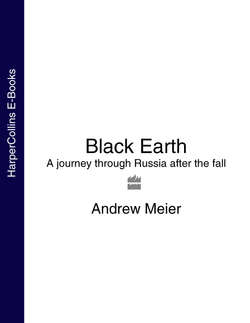Читать книгу Black Earth: A journey through Russia after the fall - Andrew Meier - Страница 7
PROLOGUE
ОглавлениеHE HAD BEEN THEIR FIRST CHILD, the elder of two sons. After his death they had turned the darkest corner of the spartan living room into a shrine. A hazy black-and-white portrait, blown up beyond scale from an army ID, loomed above the reedy church candles and a thin bouquet of plastic flowers. They had draped a black ribbon over the photograph.
“When I served,” his father said, “I served the Motherland. ‘To serve with honor and dignity.’ That’s what they told us to do and that’s what I did. For twenty-eight years.”
Andrei Sazykin died in the summer of 1996. He was killed on the north-eastern edge of Grozny, before dawn broke on August 6, the parched day the rebels reclaimed their capital. The Chechens had swarmed back by the thousands. Seven other boys in his unit also fell that morning. Three weeks earlier Andrei had turned twenty.
For the Russian forces, the Sixth of August, as it became known, would live on. It would haunt them as a humiliation, the worst day of the war. For Andrei’s parents, Viktor and Valentina, it made no sense. They would sit in the dim light of their two-room apartment in Moscow and wonder how the Chechens had so easily retaken Grozny that day. Until the letters started to arrive. One after another, Andrei’s comrades began to write to his parents.
“And suddenly,” his father said, “everything came into this terrible perfect clarity.”
The letters were blunt.
“‘Your son served well,’” recited Viktor. He had read the words a thousand times, but he traced the lines with his forefinger. In his voice there were tears. “‘But he did not die in battle. He was sold down the river. We all were.’”
Valentina said the boys came to visit. They brought a video from their last days in Chechnya. It showed Russian officers, their shirts off in the severe heat of Grozny, playing backgammon with two Chechen fighters. They were smoking and drinking, all of them laughing.
“That was the afternoon on the day before Andrei died,” Viktor said. “The boys later pieced it together. There was no battle that morning. There was a deal. The Chechens paid their way through the checkpoints. The boys were slaughtered. And when the others went looking for the commanders, they were gone”
Months after their son’s death Viktor and Valentina brought a case, one of the first of its kind in Russia, against the Ministry of Defense. They sued to restore their boy’s honor and not, as the papers claimed, to get rich on compensation. They called his death a murder and vowed to seek punishment for those who killed him.
Several Augusts later, nearly five years to the day after their son died, I went to see them again. We had spoken in the intervening years. But I had never brought them the kind of news they craved, for I had failed to convince my editors that their son’s case was a story. I had, however, followed Viktor and Valentina as they waged their long campaign. They had started in their neighborhood court and fought all the way to Russia’s Supreme Court. They even won a hearing in the Constitutional Court. But at every station they lost.
Along the way Valentina lost her job. For two decades she had taught biology in the local school. Viktor meanwhile had been forced to get a job. He now worked twenty-four-hour shifts, four times a week, at an Interior Ministry hotel, a hostelry for visiting officers in Moscow. Their savings depleted, they had also lost their hope. All they had, said Valentina, was nashe gore (“our sorrow”).
“Tell me,” Viktor said, fixing his eyes on mine. “Because I can’t understand it. But you must know. Can a country survive without a conscience?”
In the days that followed our last conversation, I left Moscow after a stay of five winters and six summers. I had, truth be told, lived in the country for most of the last decade. I had seen out the last years of the Soviet experiment and witnessed the heady birth of the “new Russia.” I had seen the romantic rise of Boris Yeltsin-and the wreckage his era wrought: the inglorious battle for the spoils of the ancient regime (an industrial fire sale of historic proportion), the military onslaught in Chechnya (the worst carnage in Russia since Stalingrad), and the rapid decline in nearly every index, social and economic, that the state took the trouble to record.
I had traveled far beyond the capital, to the distant corners of the old empire. I had lived for years in the remains of the Soviet state amid the millions of spectral dead souls who walked its ruins, as well as the rising new class of rent seekers, instant industrialists, and would-be entrepreneurs, who raced to accumulate and acquire, lest their new world vanish as quickly as the old. I had interviewed Politburo veterans and Gulag survivors, befriended oligarchs and philosophers. But I had no answer for Andrei’s parents. I could only tell them that I hoped to write a book – not only to record my travels across Russia’s length and breadth but, above all, to try to make sense of their plaintive question.
